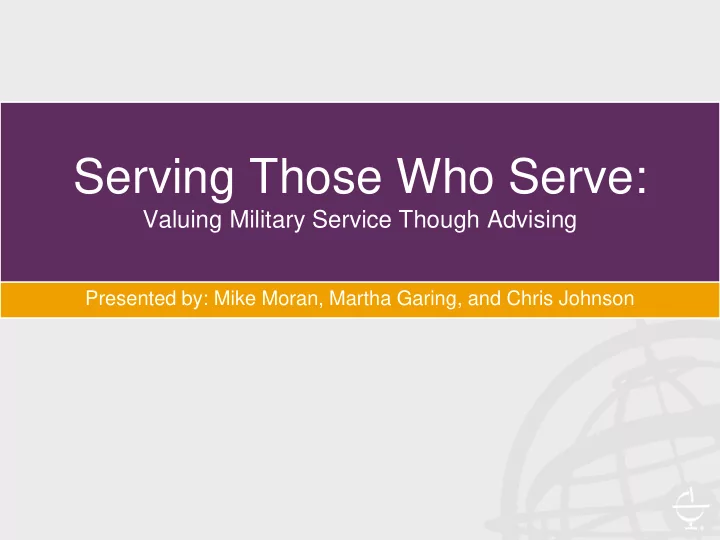

Serving Those Who Serve: Valuing Military Service Though Advising Presented by: Mike Moran, Martha Garing, and Chris Johnson
Agenda Introductions Assessing the Room Session Goals Military Culture Administrative Challenges Best Practices Questions and Wrap-Up 2
Scenario #1 Staff Sergeant Jones is enrolled in a general Liberal Arts degree. He is taking one of his remaining upper level courses and just found out he will be deployed before the end of the term. He is unsure if his location will have regular internet access or what his non-academic work responsibilities will be. Dropping the class at this point in time is not an option for multiple reasons (financial, upcoming promotion board), and he readily admits to his advisor that has been having “issues” with his instructor.
Military Culture Students - defined by military values, lifestyles, circumstances Institution - defined by services, environment, support Effective academic advisement - congruent student and military cultures
Student Traits and Values Determination – a “no - fail” attitude Respectful Tolerant of diversity Achievement & High Standards Clear expectations
Assessing Institutional Culture More difficult to assess, as it is less defined, more subtle Actions speak louder than words! Military institutional culture = military friendly?
Is Your Institution Military Friendly? Pre-assessment & enrollment Commitment Advisement Support Campus Support
Scenario #2 An Army reserve student wants to register for his first course. He wants to use TA and has never used his GoArmyEd account. He is talking to you about a SOCAD, reporting grades ETC. 8
Administrative Tasks - Student Military Tuition Assistance GI Bill GoArmyED AI, Navy Portals Grade reporting Promotion Boards- updating military records 9
Administrative Tasks - Institution Student/College Tasks Additional College Tasks Military Tuition Assistance Admissions and Enrollment GI Bill Course Registration GoArmyED Transcripts and Records requirements AI, Navy Portals Financial Aid and Bursar Grade reporting functions Promotion Boards- updating military records 10
Administrative Tasks Any one of these challenges could be the thing that keeps a student from attending any college. These challenges can keep students from attending particular institutions not prepared to assist the student. It should (and many times must) be the school that takes the lead in solving both student and institutional challenges. 11
Revisiting Our Scenarios Scenario #1 Scenario #2 Staff Sergeant Jones is enrolled in a An Army reserve student wants general Liberal Arts degree. He is to register for his first course. taking one of his remaining upper level He wants to use TA and has courses and just found out he will be never used his GoArmyEd deployed before the end of the term. account. He is talking to you about a SOCAD, reporting He is unsure if his location will have grades ETC. regular internet access or what his non- academic work responsibilities will be. Dropping the class at this point in time is not an option for multiple reasons (financial, upcoming promotion board), and he readily admits to his advisor that has been having “issues” with his instructor. 12
Best Practices: Student Experience Unofficial Evaluation Staff aware of military experiences/culture Matching Tuition Assistance Limits for undergraduate programs Military/Veteran Organizations and our lounges – dedicated advisors Certified VA Officer(s) accessible to students Support services – Counseling One Stop Shop when appropriate Career Counseling – Translating Military Experience into Civilian Resume
Best Practices: Academics Acceptance of JST/CCAF credits Low Residency Requirements Maximizes Transfer credits (military and civilian) Support Services – Tutoring and Support Degree Programs embrace military experience as valid When possible, faculty evaluations of military experience to augment ACE credit recommendations – NNPS, USASMA, JSOU Clear Degree Programs and SOC Agreements Automatic Incompletes for military service Grades of MW instead of F in certain circumstances
Conclusion and Wrap-Up How would you assess the culture of your campus, both for your service members and regarding your institutional policies/practices? What do you see as specific challenges or roadblocks? How does your advising model support your military students and veterans? How can you adapt the information from this session to best meet the needs of your institution?
Resources National Guard: Why So Special? Military Rank Structure Enlisted Personnel Warrant or Commissioned Officers Servicemembers Opportunity Colleges Joint Services Transcript Community College of the Air Force Transcript (Regionally Accredited) – January 1972 ACE Military Guide (Courses/Occupations) CLEP/DSST Examinations – Free to Military Personnel Virtual Education Center NATO Phonetic Alphabet
Financial Aid/VA Benefits G.I. Bill Benefits Vocational Rehab MyCAA Program Military Overview 17
Recommend
More recommend